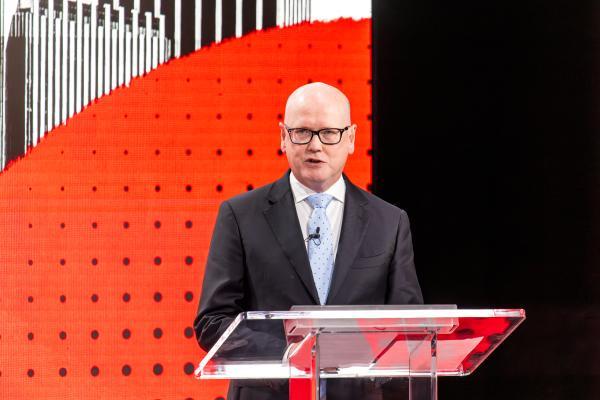Thomas Östros, Vice-President of the EIB, delivered the opening remarks at Climate & Development Finance: What Works?, an event co-organised by the European Investment Bank and Project Syndicate.
Replay the livestream of the event
Find out more about our participation at the 78th UNGA
Check against delivery

Ladies and gentlemen, a very warm welcome to those of you joining us in person here in New York and online.
I must say the title of today’s event really appeals to me – What Works ? – it reflects the essence of why we are here this week. To find solutions, together, to the challenges that we face.
We don’t need to convince each other that climate change is an emergency, nor that it is key for development globally.
What we DO need to do, is create a new momentum around the business case for global climate action.
Economists like Vera Songwe, (who I’m so happy is with us today), Nicholas Stern and Amar Bhattacharya estimate that the developing world needs at least $350 billion more in annual, low-cost finance to bolster climate resilience and to protect health systems against pandemic events.
We will only bridge this gap by turning this “need” into an “investment case”. I believe climate action is the great growth accelerator for developing countries in the years to come… and the great source of resilience for the most vulnerable.
Decarbonization is NOT de-industrialisation, rather the opposite.
Decarbonisation means innovation, technology, growth, development – stability and prosperity for future generations.
We need to scale up the models that work today – and use more ingenuity to come up with new solutions that can be scaled up, quickly.
Public finance and multilateral development banks have a central role to play in:
- taking the risks that the private sector is not willing to take,
- going into sectors where the economic profitability is yet unclear, and
- bringing to the market what we call “patient” capital.
The Bridgetown Initiative, championed by Barbados Prime Minister Mia Mottley and the UN Secretary General António Guterres, pushes us to urgently reform the international financial architecture - to address the development needs of the Global South.
International financial institutions and Multilateral Development Banks (MDBs) like the European Investment Bank, must play their part.
Our role is to leverage every cent our shareholders give us by crowding in private investment for projects that cut emissions, improving countries’ resilience – not just to climate change but also to other crises, like pandemics.
Let me stress that we have to go well beyond the low-hanging fruits. We must provide robust support for innovative and truly transformative technologies to decarbonise for example hard-to-abate industries, such as steel and concrete. Here we really need cutting-edge solutions.
We can – and must – confront the challenges head-on and win the fight against climate change, not through the fear that can paralyse us, but through the opportunities that make our hearts beat.
I know how much work can be needed to get a climate project off the ground – especially in adaptation – to make it both bankable and to make it achieve its intended impact.
Listening carefully to our partners will help to meet the legitimate demand of the developing world for tools that square the circle:
- between the resources available and the lack of technical capacity to put projects into motion,
- between massive investment needs and debt sustainability, and
- between investment and high vulnerability to disasters.
To respond to these challenges, at the EIB, we have recently agreed to extend the tenure of our sovereign loans to up to 30 years, with grace period up to 10-years. We have increased our global presence to better listen and share our technical expertise. And to bring to life other ideas such as debt-for-nature and debt-for-climate swaps – and including climate resilience clauses in our investment agreements.
In Europe, I think, we are waking up. But we are still too slow: we need a very strong coffee.
Our collective awakening was rather traumatic, on 24 February 2022 with the Russian aggression in Ukraine.
Our reliance on Russian gas was also to the detriment of market incentives for a shift towards renewables. It provided a bitter lesson: that investing in fossil fuels is just a plain bad idea – also from a financial perspective.
In 2019, at the EIB we had already decided to phase out investment in all unabated fossil fuel energy projects, including natural gas.
And in 2020, we committed to dedicating at least half of all our funding to climate action and environmental sustainability by 2025, supporting 1 trillion euros of green investment by 2030.
We are well on track – not just in terms of the financial volumes, but also in the impact and focus of our projects: technology-driven, supporting the green transition.
Our awakening has finally prompted us to establish and nurture more eye-level partnerships worldwide, based on innovative climate action, on a strong commitment to adaptation, and on building investment bridges with the world.
The case for climate action is stronger than ever.
With those words, I wish you a successful morning.
Thank you.